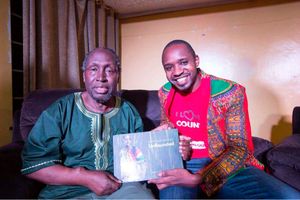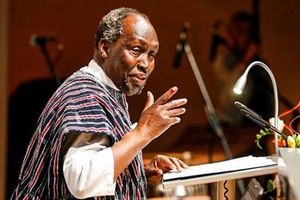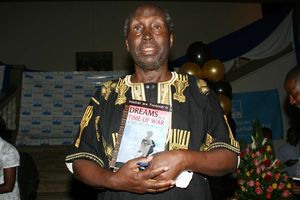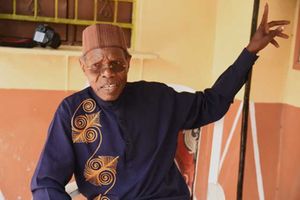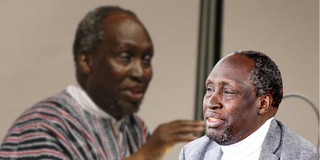
Renowned literature scholar Ngugi wa Thiong’o.
Once upon a time, a long article came out in The Guardian after a Kenyan writer had spent ‘three days on the cross’ with Kenya’s then ailing, now deceased leading literary icon, Ngugi wa Thiongo, in his home in some suburbia of California, the United States.
Predictably, almost all the facetious fuss on social media was about the impending ‘grey divorce’ of the literary don from Njeeri, his wife of three decades standing, and his supposed benign medical neglect in the USA, that bordered farce at certain points.
This is not the time, nor the space, to either delve or attempt to dissect those issues, especially in light of the fact that the lights have just gone out on our most famous national Man of Letters – but the octogenarian author, of worldwide renown, did raise some remarkable ‘language philosophy’ issues in his long lifetime that have, remarkably, gone unremarked upon across time.
First, Ngugi dismissed not just Kenyan Sheng, and its urban ‘Engsh’ counterpart, but also Nigerian pidgin (and all Creole in the Commonwealth) as ‘normalised abnormality.’
Also Read: Ngugi wa Thiong’o: Life and Times
For decades, in fact, Ngugi had been dismissive of any tongue that merges a European and local language, as Sheng does Swahili and English, claiming it is the colonised trying to claim the coloniser’s language, and therefore in his words ‘becomes a local version of (lingual) enslavement.’ Let us put this Thought within the timeframe of The Late Great Man, and the context of Our Times.
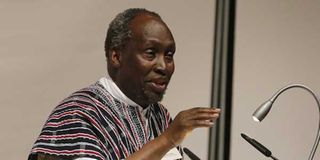
The late Ngugi wa Thiong'o
Ngugi wa Thiongo was born in 1938, at a time when the ‘ruling’ political party in Central Province was the KCA (Kikuyu Central Association) led by the likes of Harry Thuku, and with its most Anglophilic member Jomo Kenyatta in faraway England, enjoying the fruits of a farmers’ labour even as he penned Facing Mount Kenya.
Young Ngugi’s teenage sensibilities, by his own admission, were shaped by the colonialist’s brutal war on the Mau Mau, which he surely viewed as a battle against the Agikuyu, and in later enlightened years after his ‘dalliance with Alliance,’ arrived at a romantic albeit ethnocentric view on ‘his’ language, and later our mother tongues, as the carrier of all that is intellectually pure and free, and true to the African ‘soul.’
As the KANU versus KADU Civil Wars of the likes of Tom Mboya against Masinde Muliro raged on in the Lancaster Conferences in Great Britain – becoming smaller by the day with every other African country breaking away from its colonial yoke – language wars were raging across the border in Makerere.
There was a lot of kelele by the likes of Nigerian author Obi Wali against ‘elitist’ playwrights like then young Wole Soyinka, as the former declared that ‘African literature can only be written in African languages,’ an eventually obsolescent opis that Ngugi would eventually, fanatically embrace.
Here is the truth about all languages that sounds like a cutting of our mother tongue by a Prophet Jeremiah, or for those with a Pollyanna complex, the same kind who cannot accept that AI (Artificial Intelligence) will make a lot of mechanical, and several technical jobs, a 20th-century redundancy.
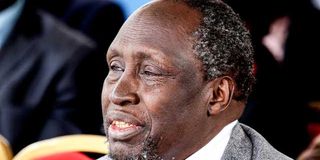
Renowned literature scholar Ngugi wa Thiong’o when he visited Eastleigh Boys High School on June 10, 2015, to celebrate 50 years of his book ‘Weep Not Child’.
UNESCO estimates are that 3000 of the world’s 6,500 languages are going to go extinct by the end of the century.
Of the remaining 3,500, only 1,200 will still be spoken in three centuries’ time, with the Big Six being English, Chinese, French, Hindi, Spanish and Swahili, with German and Arabic possible survivors of this mass language extinction.
Whereas Dr Matunda Nyanchama of Nsiema Press, who publishes books in both English and Ekegusii, agrees that Ngugi’s was a noble cause, he also has said we cannot be merely lingual purists trying to hold back the ‘incoming tides of major global language domination in world time.’
Adipo Sidang, the author of Parliament of Owls, couldn’t give a hoot about some of wa Thiongo’s late language (self) promotional antics, such as procuring the services of Jalada literary magazine just so as ‘to boast about having the most translated tale in the world’ ( 40 languages).
Indeed, Ngugi wa Thiongo lived in a privileged place where he could afford to go to many white spaces (as well as get awards from separatists like the Catalans) and ‘exoticise’ the mother-tongue literature debate, as Professor Shaul Bassi of the CaFoscari University in Venice said.
"We invited him here about ten years ago (and paid) just for this," said Bassi in a discussion, yet Bassi himself is a specialist in that most English of bards, Shakespeare, who gave so much to the English language.
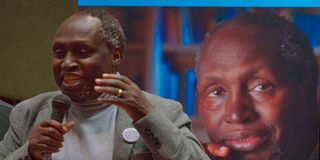
Author, playwright and critic Ngugi wa Thiong'o addresses fans on June 13, 2015 during a book signing to celebrate the golden jubilee of his first book 'Weep Not Child' in the Kenyan capital, Nairobi.
Former Ambassador to Kenya Dr. Mokhtar Ghambou, who was a student of Prof wa Thiong'o in Yale in 1989, appreciates the intellectual icon for his ‘decolonising the mind’ theory, but still thinks Ngugi may be mistaking the tools (language) for the substance (culture).
‘You can use your saw to make a perfectly beautiful and suitable stool.’
In other words, away from the propaganda of lingual purism, someone with a perfect soul and mind understanding of their Pan-Africanism, for example, can express it in perfect English to undermine foreign mindsets, and be the mockingbird to the makers of stereotypical trope.
Also Read: Loss and impeccable legacy in Ngugi death
My core issue is with the code of ‘modern languages’ that Ngugi wa Thiongo fallaciously called a ‘normalised abnormality.’
What would really be abnormal is if languages stayed in a perfect state of statis, spoken as pure English or Swahili or Kikuyu or ekegusii, et cetera. The French we hear spoken in Paris isn’t the same one your ear will catch in a street in Casablanca, or on a train in Montreal.
This is the reality of 2025.
Spoken language, especially, becomes a code of argot, slang flung into jargon, a pidgin, a creole lingua, our ever-evolving Engsh, now mainstreamed into every online advertisement seeking to sell anything to Gen Zees, most millennials and even a lot of Gen Xers who are ‘hip.’
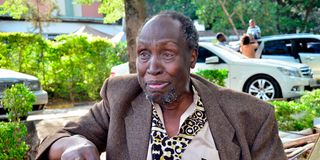
Renowned author Ngugi wa Thiong'o during an interview on February 7, 2019.
Ngugi wa Thiongo left Kenya four decades ago, and only returned in 2004, and even then, for a brief homecoming.
The year he left, 1983, was when ‘sheng’ was at its infancy in Kenya, with its fathe, mathe, sinya (police) basics as the matatu culture took a hold in the Eastlands areas of Nairobi.
By the time the Great Man returned in 2004, as a mid-sexagenarian, Sheng had become the lingua franca of the zeitgeist of a whole post-August 1982 coup generation, the same coup that forced wa Thiong'o into self-exile.
The language of the millennials, or the ‘normalised reality,’ as to call it an abnormality is really quite an absurdity.
After all, English itself started as an Anglo-Saxon tongue, and in fifteen centuries, sucked in Germanic, Norse, Romanic, Celtic, Latinate, French, Indian and even several Swahili words.
When we say the ‘Safari Rally,’ that isn’t Engsh.
Professor Abdulrazak Gurnah, whose Nobel Prize for Literature win in 2021 made a Ngugi win a very unlikely prospect with the Bookies, with no post-humous Nobels, had this to say on the ‘language debate’ in an interview in 2022, with this writer.
"Language is not a canteen where one careens off to, to pick up a lingo off the menu and choose to cook a book, just so you can serve ‘mother tongue’ to a specific selection of your customers. Just write well."
In the language you best know.
Tony Mochama is the award-winning author of several books, across many genres. [email protected]
Read --> Ngugi wa Thiong’o: Life and Times
You may also check out this one --> World mourns as Ngugi turns into ‘a grain of wheat’


